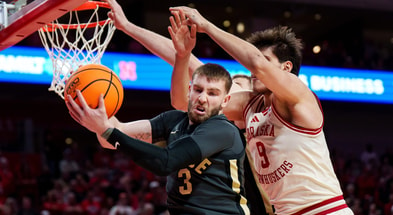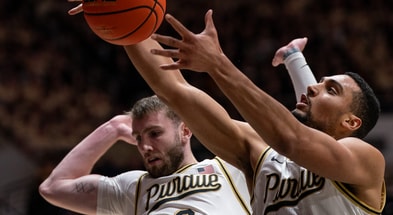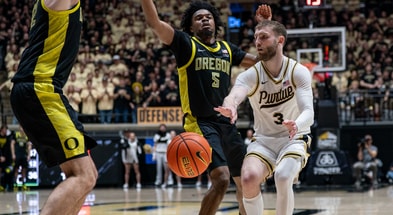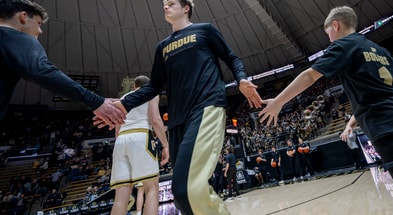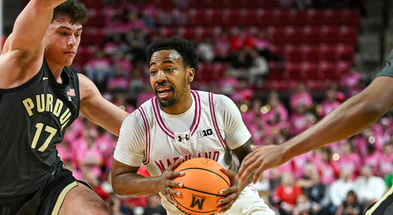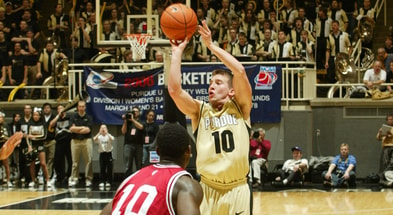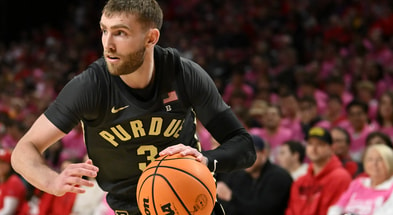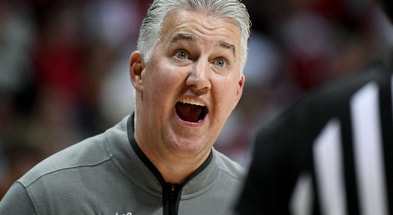Five Questions with Purdue consultant/Profilebehavior.com's Chad Q. Brown
Here is a five-question excerpt (edited for clarity) from our recent Gold and Black LIVE interview with Purdue consultant/ProfileBehavior.com’s Chad Q. Brown. Chad has worked with Purdue men’s basketball since forming his company in 2013 and has grown his sports consulting business to include numerous college programs, the NFL, and much more.

GoldandBlack.com: Remind our readers what ProfileBehavior is all about.
Brown: It’s sometimes difficult to understand what we do. I am a consultant to college athletic departments across the country, with the niche being personality assessments. We have some (proprietary) software as well and we started in 2013 with our first client Matt Painter at Purdue.
I’m a Purdue grad; we travel the country, working with NFL and NBA teams, as well as numerous college athletic departments. In the recruiting and transfer portal process those personality assessments help communication. We use data with our software and and the tech to just help everybody understand each other better and make better decisions and even grow some self-awareness in the process.
It’s been going on in the corporate world for 100 years, but it wasn’t as big in college athletics, so we decided to start a niche there, and it’s been going great.
GoldandBlack.com: How has your business evolved since starting with Painter in 2013?
Brown: Matt was the lab for us early on. We have been the data point knowing that Coach Painter just want to (use it to) understand his players better. We’ve gone from just the this DISC assessment (it stands for Dominance, Influence, Steadiness, and Conscientiousness) that so many use; 70% of Fortune 500 companies use it, but it’s so simplified., Yet, it’s an awesome way to teach people, but you gotta have more than just that one. So we have a couple others out there that some people know, the big five (for example).
We have a couple of others out there that some people know, like the big five. Additionally, some people are aware of different values assessments that reveal things like whether people prioritize family, learning, or helping others. There’s different values assessments that show you things like how much people care about family, learning, helping others. Maybe it’s money (they care about; things like that that show up in our stuff. And that’s been an evolution, but we’ve got it really dialed in right now.
It can’t be complicated (in the process of administering the test). You need to make things easy for coaches since they have to move quickly in everything they do. Speed is everything. No recruit or prospect in the portal wants to take a long assessment. And some of them are long because they need to be. But ours had to be built for that short time frame, and had to be powerful too.
GoldandBlack.com: And Painter has evolved, too?
Brown: As everyone knows, Purdue was at (or near) the bottom of the Big Ten in 2013, 2014 and now they are the preseason top-ranked team in the country. That is all, Matt Painter, and he’s involved a lot of coaches and executives like me. Sometimes people get into their lives, and they’re good at our job, and they don’t feel the need to move or grow. Matt Painter is the absolute opposite of that.
Top 10
- 1New
Top 10 QBs
Ranking QBs heading into 2026
- 2
Charlie Woods
Tiger Woods' son commits to FSU
- 3Hot
Top QB Battles
Quarterback races to watch
- 4Trending
Sleeper QBs for 2026
Kirk Herbstreit makes picks
- 5
Hot Seat Watch
CBB coaches under pressure
Get the Daily On3 Newsletter in your inbox every morning
By clicking "Subscribe to Newsletter", I agree to On3's Privacy Notice, Terms, and use of my personal information described therein.
GoldandBlack.com: Money plays a bigger role in all college athletics today. What role can you play in determining the needs of prospects coming in?
Brown: Everybody likes money; that is a given. We work with some NBA teams, and the NBA folks have told me they’re watching. They’re watching to see if these guys can make mature decisions at an early age.
Purdue is probably overly transparent, but I think that builds trust over time, and the kids go “all right, because we’re getting paid.” If you get paid enough. I. And you’re winning, its all right. The question is, for (many of the top kids at Purdue) do you want to go somewhere and learn a whole new system in one year just to make another couple 100 grand? The answer for some might initially be “sure I do” but when you start to listen to the adults talk, it’s like, no, like, you got a lot of money right now. Stay here, maximize your ability, and then go for the real money in the NBA (or overseas). That is what I hear Paint and a lot of the college basketball coaches we work with, are chasing.
GoldandBlack.com: What kind of work have you done with Barry Odom and Purdue football?
Brown: We’ve done a little bit with them, but in their defense, they’ve had to go so fast in their time at Purdue. It’s like working with the equivalent of 10 basketball teams, with the wide receiver room, the D line room, and so on. It’s trickier for a head coach to know all those things. But they’ve been great. They’ve used it with the quarterbacks and obviously a lot of the new guys.
What I see with Barry Odom is an unbelievably professional, disciplined coach. I said it on the last podcast, and I’ll repeat it. It’s kind of the ghost of Joe Tiller, to me, because I worked with Joe for three years, and I played for Joe (Brown was a walk-on receiver) for a year. And so what does that mean? He has discipline within a football program and has established a regimen of togetherness.

